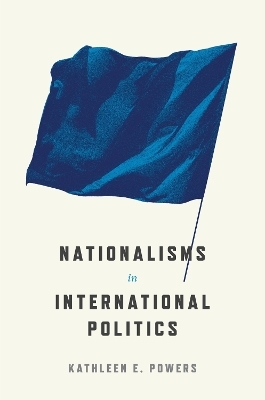
Nationalisms in International Politics
Seiten
2022
Princeton University Press (Verlag)
978-0-691-22456-5 (ISBN)
Princeton University Press (Verlag)
978-0-691-22456-5 (ISBN)
How the ideas that animate nationalism influence whether it causes—or calms—conflict
With nationalism on the rise around the world, many worry that nationalistic attitudes could lead to a surge in deadly conflict. To combat this trend, federations like the European Union have tried to build inclusive regional identities to overcome nationalist distrust and inspire international cooperation. Yet not all nationalisms are alike. Nationalisms in International Politics draws on insights from psychology to explore when nationalist commitments promote conflict—and when they foster cooperation.
Challenging the received wisdom about nationalism and military aggression, Kathleen Powers differentiates nationalisms built on unity from those built on equality, and explains how each of these norms give rise to distinct foreign policy attitudes. Combining innovative US experiments with fresh analyses of European mass and elite survey data, she argues that unity encourages support for external conflict and undermines regional trust and cooperation, whereas equality mitigates militarism and facilitates support for security cooperation.
Nationalisms in International Politics provides a rigorous and compelling look at how different forms of nationalism shape foreign policy attitudes, and raises important questions about whether transnational identities increase support for cooperation or undermine it.
With nationalism on the rise around the world, many worry that nationalistic attitudes could lead to a surge in deadly conflict. To combat this trend, federations like the European Union have tried to build inclusive regional identities to overcome nationalist distrust and inspire international cooperation. Yet not all nationalisms are alike. Nationalisms in International Politics draws on insights from psychology to explore when nationalist commitments promote conflict—and when they foster cooperation.
Challenging the received wisdom about nationalism and military aggression, Kathleen Powers differentiates nationalisms built on unity from those built on equality, and explains how each of these norms give rise to distinct foreign policy attitudes. Combining innovative US experiments with fresh analyses of European mass and elite survey data, she argues that unity encourages support for external conflict and undermines regional trust and cooperation, whereas equality mitigates militarism and facilitates support for security cooperation.
Nationalisms in International Politics provides a rigorous and compelling look at how different forms of nationalism shape foreign policy attitudes, and raises important questions about whether transnational identities increase support for cooperation or undermine it.
Kathleen E. Powers is assistant professor of government at Dartmouth College. Website kepowers.com Twitter @ke_powers
| Erscheinungsdatum | 08.03.2022 |
|---|---|
| Reihe/Serie | Princeton Studies in Political Behavior |
| Zusatzinfo | 35 b/w illus. 20 tables. |
| Verlagsort | New Jersey |
| Sprache | englisch |
| Maße | 156 x 235 mm |
| Themenwelt | Sozialwissenschaften ► Politik / Verwaltung ► Europäische / Internationale Politik |
| Sozialwissenschaften ► Politik / Verwaltung ► Politische Systeme | |
| Sozialwissenschaften ► Politik / Verwaltung ► Politische Theorie | |
| ISBN-10 | 0-691-22456-0 / 0691224560 |
| ISBN-13 | 978-0-691-22456-5 / 9780691224565 |
| Zustand | Neuware |
| Informationen gemäß Produktsicherheitsverordnung (GPSR) | |
| Haben Sie eine Frage zum Produkt? |
Mehr entdecken
aus dem Bereich
aus dem Bereich
Studienbuch
Buch | Hardcover (2023)
De Gruyter Oldenbourg (Verlag)
44,95 €
Amerikas Strategie der Vorherrschaft und der Kampf um Eurasien
Buch | Softcover (2024)
NOMEN Verlag
20,00 €


